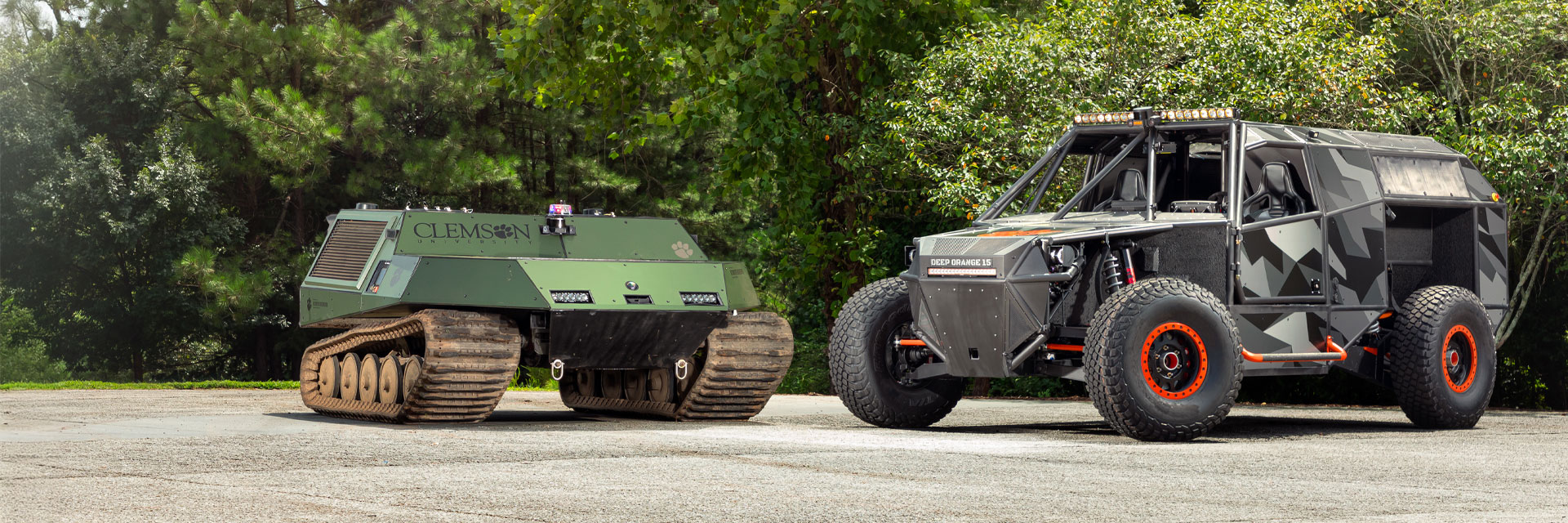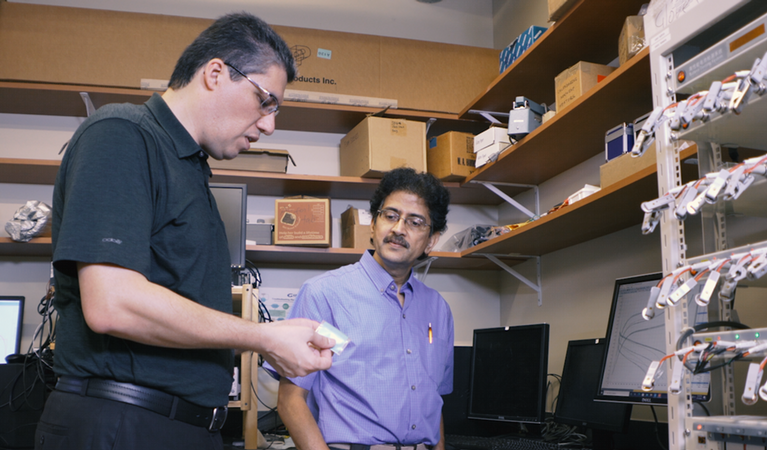
Off-Road Autonomy
Autonomy projects focus on the fusion of data from sensing and estimation to provide situational intelligence, as well as machine learning for algorithm development and novel approaches to multi-scale team routing.


VIPR-GS Researchers Reach New Milestone
VIPR-GS Project "Multiscale Modeling of High-Temperature All-Solid-State Battery Cells and Packs" reached a new milestone in their research, as outlined in Green Chemistry Journal Vol. 26. VIPR-GS researchers from the Automotive Engineering and Physics and Astronomy Departments teamed up with U.S. Army DEVCOM GVSC and the USDA Forest Service to "engineer a novel silicon (Si)-based material called silicon nano-quill (SiNQ) for sustainable energy storage applications."
VIPR-GS is a research partnership between Ground Vehicle Systems Center and Clemson University aimed at the forefront of transformational mobility. The center boasts expertise in autonomy, connectivity, propulsion systems, sustainable energy, digital engineering and virtual prototyping for both off-road and on-road vehicles.
Located at CU-ICAR in Greenville, SC — Clemson's groundbreaking innovation campus — VIPR-GS is well-positioned for breakthroughs in the worlds of military and commercial transportation.

Autonomous automotive technologies are changing economies and global industries – they are also a driving force behind military modernization. Bringing high-speed self-driving vehicles to life on- and off-road requires new concepts and algorithms to be tested expeditiously and cost-effectively – all of which happen through virtual prototyping.
The mission of the VIPR-GS Research Center is to develop innovative tools and methodologies for virtual prototyping and agile physical prototyping, enabled by research breakthroughs in off-road vehicle autonomy and vehicle propulsion, including smart management of fleet energy resources. The overarching goals are to provide new modeling and simulation capabilities, software tools and methodologies, as well as hardware demonstrations supporting GVSC’s research and development mandate, and driven by the needs of the Army’s NGCV program, one of the six top priorities of the U.S. Military.
There are three focal areas in the Center: autonomy for off-road vehicles in an unstructured environment, vehicle propulsion and fleet energy, and digital engineering. Models, algorithms, analytical capabilities and decision-making tools resulting from the research are evaluated by fabricating a physical mock-up of an optionally manned, non-combat, off-road ground vehicle. Discoveries and breakthrough innovations from the VIPR-GS Center research are fabricated and validated via Deep Orange, the University's long-running educational prototyping program, as a demonstrator and test bed for future research efforts.
The VIPR-GS Center's impact reaches beyond any single project by compressing the time needed for design and development in the autonomous space. Not only does this allow partners to significantly reduce timelines for innovation, but virtual prototyping enables new design capabilities that cut across industry sectors and applications.

Autonomy projects focus on the fusion of data from sensing and estimation to provide situational intelligence, as well as machine learning for algorithm development and novel approaches to multi-scale team routing.

Propulsion and smart energy projects focus on developing high-fidelity simulation tools and validation methods for advanced high power-density engine concepts, next generation battery technologies, resilient electrified propulsion architectures, and robust thermal management systems to meet rigorous mobility requirements on diverse and demanding terrains.

The autonomy and advanced propulsion focuses drive digital engineering projects to create a comprehensive virtual prototyping framework for complex systems such as the modern off-road autonomous vehicle. This framework can produce a fully developed, complex digital twin that can be validated virtually by physical prototyping.

Founded in 2020, VIPR-GS develops advanced digital engineering and simulation tools for smarter, faster, more cost-effective autonomous vehicles. The center’s impact reaches beyond any single project by compressing design timelines and development in the autonomous space. Virtual prototyping also offers new design capabilities that cut across industry sectors and applications.
Apparao Rao and Morteza Sabet
Beshah Ayalew and Jiangfeng Zhang
Yunyi Jia, Venkat Krovi and Bing Li
Jianhua Tong
Benjamin Lawler
Laura Redmond
Pamela Murray-Tuite and Matthias Schmid
VIPR-GS is operated out of Clemson University, one of the nation’s most active research institutions. Located at CU-ICAR, the University’s world-renowned automotive research center in Greenville, SC, VIPR-GS leverages Clemson’s deep research expertise and interdisciplinary culture to deliver breakthrough innovation.


Director, VIPR-GS
Kulwicki Endowed Professor
Acting-Dean, Department of Automotive Engineering
Clemson University

Deputy Director, VIPR-GS
Professor of Civil Engineering
Clemson University

Managing Director, VIPR-GS
School of Mechanical and Automotive Engineering
Clemson University
| Name | Title | |
|---|---|---|
| Yunyi Jia | Off-Road Autonomy Focus Area Director | yunyij@clemson.edu |
| Beshah Ayalew | Propulsion Systems and Smart Energy Focus Area Director | beshah@clemson.edu |
| Jerome McClendon | RTK Integration Advisor | jmcclen@clemson.edu |
| Greg Mocko | Virtual Prototyping and Digital Engineering Focus Area Director | gmocko@clemson.edu |
| Pamela Murray-Tuite | Associate Director, New Federal Initiatives | pmmurra@clemson.edu |
| John Wagner | Associate Director, Education and Opportunity | jwagner@clemson.edu |
| Ben Lawler | Associate Director, Propulsion Systems Integration | bjlawle@clemson.edu |
| Johnell Brooks | Associate Director, US Service Member Engagement | jobrook@clemson.edu |
